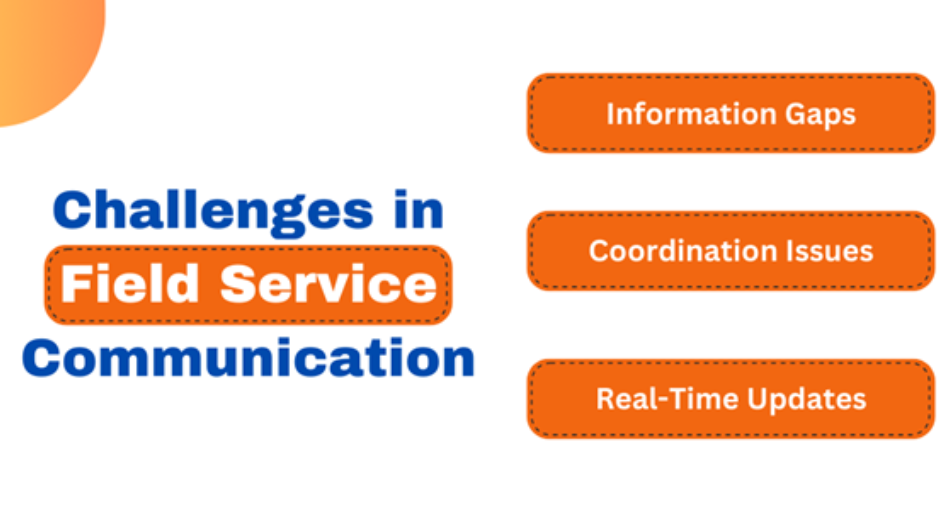Effective communication is vital for field service operations. Without it, issues can escalate, efficiency drops and customer satisfaction suffers. The solution often lies in adopting the right tools. One such tool is a field service management system.
This blog explores how communication can be improved in field service management. We also cover the role of a field service management app in enhancing communication.
Why Communication Matters in Field Service
Communication in field service involves coordinating between field technicians, managers, and customers. Poor communication can lead to missed appointments, incorrect information, and overall dissatisfaction. For instance, if a technician arrives at a job without the necessary information, it can delay the service and frustrate the customer.
On the other hand, effective communication helps in:
- Streamlining operations
- Reducing errors
- Improving customer satisfaction
- Enhancing team collaboration
Inefficient Communication and Information Sharing: The Root of Field Service Problems
Nowadays, clear and timely communication is essential. Unfortunately, many businesses struggle with inefficient communication systems, leading to problems affecting service delivery. This inefficiency stems from various factors, including outdated communication tools, lack of real-time information, and the absence of a centralized platform for data sharing.
1. Impact on Dispatchers
Dispatchers play a crucial role in managing field service operations. Their job is to assign tasks, schedule appointments, and ensure that technicians have all the necessary information. However, when communication is inefficient, dispatchers face significant challenges. They may struggle to relay accurate information to technicians, leading to scheduling conflicts and missed appointments. Moreover, dispatchers cannot make informed decisions without real-time updates, resulting in delays and reduced productivity.
2. Impact on Technicians
Technicians, the frontline workers in field service, are directly affected by communication gaps. When they receive incomplete or outdated information, they cannot perform their tasks efficiently. For instance, a technician might arrive at a job site only to discover that they lack the necessary tools or parts, leading to wasted time and resources. Additionally, without a reliable communication system, technicians may find it difficult to report issues or seek assistance, further compounding the problem.
3. Impact on Customers
Customers, the end recipients of field service, also suffer when communication is poor. Inefficient communication can lead to missed appointments, delayed services, and incorrect billing. Moreover, customers often feel frustrated when they cannot easily communicate with the service provider to get updates or report issues. This frustration can lead to negative reviews, reduced customer loyalty, and ultimately, a loss of business.
Challenges in Field Service Communication

Several challenges can impact communication in field service:
1. Information Gaps
Information gaps occur when technicians lack the details needed to complete a job. This might happen due to outdated or incomplete data. Consequently, when technicians are not updated with the latest information, they may arrive unprepared. This situation can lead to delays and inefficiencies.
2. Coordination Issues
Coordinating between various teams and departments can be challenging. For example, if a technician needs additional support or resources, the request might not be communicated effectively. As a result, this can cause delays in service and a negative customer experience.
3. Real-Time Updates
Field technicians need real-time updates to handle tasks efficiently. Without immediate information on changes or new instructions, they may not perform their duties optimally. Therefore, timely updates are essential to avoid miscommunication and enhance service delivery.
How a Field Service Management System Enhances Communication
A field service management system addresses many of these communication challenges. Here’s how it helps:
1. Centralized Information
A field service management system provides a centralized platform where all relevant information is stored. Technicians can access updated job details, customer history, and equipment information from one place. This centralization reduces information gaps and helps technicians be better prepared.
2. Improved Coordination
With a field service management system, coordination between teams becomes streamlined. Managers can assign tasks, track progress, and communicate directly with field technicians. This enhancement improves response times and ensures that everyone remains on the same page.
3. Real-Time Communication
Field service management apps offer real-time communication features. Technicians can receive instant updates and send feedback immediately. As a result, any changes or issues are addressed quickly, minimizing delays and improving service quality.
4. Efficient Scheduling
A well-designed system allows for efficient scheduling of tasks. Managers can optimize routes and schedules based on real-time data. Consequently, technicians spend less time traveling and more time on productive tasks.
Benefits of Using a Field Service Management App
Field service management apps offer several advantages for communication:
1. Instant Notifications
Field service management apps send instant notifications for job updates, changes, or new assignments. Technicians receive real-time alerts, which helps them stay informed and act promptly.
2. Easy Access to Information
Technicians can access job details, customer records, and equipment information directly from their mobile devices. This easy access ensures they have all the necessary information before arriving at a job site.
3. Enhanced Collaboration
The app facilitates better collaboration between field technicians and office staff. Managers can track progress, provide support, and communicate with technicians directly through the app. This fosters a more cohesive work environment.
4. Efficient Documentation
Field service management apps enable technicians to document their work efficiently. They can upload photos, add notes, and complete forms digitally. This documentation is instantly available to managers and helps in maintaining accurate records.
5. Customer Interaction
The app can also enhance customer interaction. Technicians can update customers on their service status, estimated arrival times, and any changes to the schedule. This transparency improves customer satisfaction and trust.
Implementing a Field Service Management System
To maximize the benefits of a field service management system, consider the following steps:
1. Assess Your Needs
Evaluate your current communication processes and identify areas where improvements are needed. Determine which features will address your specific challenges and enhance communication.
2. Choose the Right System
Select a field service management system that aligns with your needs. Look for features such as real-time updates, mobile access, and integration capabilities. Ensure the system is user-friendly and scalable.
3. Train Your Team
Provide training for your team to ensure they can effectively use the new system. Proper training helps maximize the benefits and ensures a smooth transition.
4. Monitor and Adjust
Once implemented, monitor the system’s performance and gather feedback from users. Make necessary adjustments to improve its effectiveness and address any emerging issues.
Final Words
Effective communication is crucial in field service operations. A field service management system and app can significantly enhance communication by providing centralized information, improving coordination, and offering real-time updates. By implementing the right tools and following best practices, you can streamline your field service operations, reduce errors, and improve customer satisfaction.
Investing in a field service management system is not just about adopting new technology; it’s about enhancing communication and operational efficiency.
Related Article: Everything You Should Know About Field Service Management









